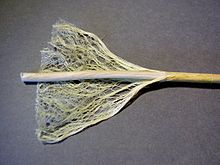Roast
As roasting or Stamp (formerly Röthen ) one of the operations for obtaining is known vegetable fibers in industrial hemp , flax , jute and other bast fiber plants through the fiber opening . During the roasting process, the pectins are dissolved in the plant stem. This 'plant glue' connects the fibers with the solid wood components of the plant. In subsequent processes ( breaking , swinging , panting ) the individual components are then separated from one another.
The word roasting has its origin in rotten , i.e. H. rot, become 'red' (red originally referred to a rather brownish shade). The process gives the fibers their typical gray-brown to flax-blonde color, while unroasted flax (green flax) becomes yellowish and is more difficult to process.
Organic roasting
When Tauröste even Feldröste called the cut or gerauften plant stalks are laid out on the field or a meadow. The formation of dew favors the development of microorganisms (especially bacteria) which dissolve the pectins. This process takes several weeks. It is ecologically beneficial as the released components migrate into the soil and less fertilization is required when the field is replanted. The dew rust is just as risky as the entire fiber harvest can be destroyed by excessive rainfall. Despite everything, it is the most important process in the production of flax fibers ( linen ).
The water retting is in open water, in water basins ( flax retting performed) or tanks. The plants either lie in warm water for several days (warm water roasting) or two to three weeks in cold water (cold water roasting). This form of roasting has a greater impact on the water, but is often more economical because it takes less time.
Chemical roasting
In chemical roasting, the pectin is dissolved with the help of chemicals and the action of heat. Are used for this z. B. sulfuric acid , sodium hydroxide or chlorinated lime . The process is extremely quick (half an hour compared to several days for hot water roasting) and easy to control. However, it is very expensive and the fibers are stressed. Therefore, this procedure has not yet been able to gain acceptance.
Physical disclosure
In addition to biological and chemical roasting, there is also the option of separating the fibers physically by means of steam pressure decomposition ( steam explosion ) or by decomposition using ultrasound .
literature
- Anton Schenek: Natural fiber dictionary . Deutscher Fachverlag, Frankfurt / Main 2001; 165. ISBN 3-87150-638-9


